Cherry Grove Has A Problem
How LGBTQ+ Legacy Institutions Fail On Race: The Case In Cherry Grove
Note: Fire Island has a lot of organizations with a lot acronyms. They get confusing. I’ve made an index at the very bottom of this article for you to reference.
In Cherry Grove, an enclave celebrated for its LGBTQ+ history, the Arts Project of Cherry Grove (APCG) and Diane Romano are widely revered. Yet, it's precisely because of their esteemed status that their substantial blind spots on racial equity are so disheartening—and personal to me, as they've been a persistent irritant for the last three years. While APCG dutifully maintains the oldest gay theater in the United States, the Cherry Grove Community House, and Romano boasts a 12-year leadership stint in community service as the former President of the Cherry Grove Community Association (CGCAI), their laudable efforts crumble when the topic of race is broached outside their comfort zones. Further complicating this is the historically exclusionary nature of the American property system–a dynamic that APCG leverages through its control of the Community House. This isn't just idle critique but a move toward transparency and accountability. This article aims to reveal the troubling limitations these esteemed figures have shown in racial inclusivity, highlight their acts of retaliation and concrete impacts on The Black and Brown Equity Coalition of Fire Island (BaBEC) and myself, and articulate a way forward that expects more than half-hearted gestures of performative allyship.
On Friday, August 25th, in collaboration with The American LGBTQ+ Museum and I’m From Driftwood, I was supposed to moderate a talkback discussion at the Cherry Grove Community House where attendees could hear stories of Fire Island history from Thom “Panzi” Hansen, who as of this summer is the former President of the APCG, and Pearl Bennett, a Black transgender woman who was a chef in Cherry Grove during the 1990s. A week before this event, the Museum called to inform me that APCG canceled the event because I was the moderator.
I’ve never fully written about the history between this organization and myself. But in the three years that I’ve been doing antiracist advocacy on Fire Island, what I’ve come to learn is that the lack of public transparency has served no one but them. When I mention things to people in passing who don’t know the entire history, I’m left to look like the “angry Black guy.” Let me be clear: After three years of dealing with their persistent aggressions, I am the angry Black guy. So, once and for all, I’m laying it all out.
In June of 2020, I was the person who sparked and sustained candid discussions about antiracism in Cherry Grove and Fire Island Pines when I penned an article called “A Guide to Being Antiracist on Fire Island.” It's important to reflect on the fluidity of time and the dynamism of social progress, as in that article, I didn't shy away from calling out local business owners who I felt needed to step up. The beauty of candor is its potential to enact change; several of those called out have since become allies and collaborators. An article is merely a snapshot in time; it captures the sentiment and circumstances of a particular moment but isn't a blueprint for eternity. It is a testament to how today's critique can be tomorrow's catalyst for transformation.
The momentum of that article led to me founding a nonprofit organization that advocates for BIPOC LGBTQ+ equity in Cherry Grove and Fire Island Pines called the Black and Brown Equity Coalition, more commonly known as BaBEC. Initially, the plan was never to start an organization; it was to work as a committee underneath CGCAI, but I quickly realized that this would not work.
At the time, Diane Romano was the President. I met her at the Cherry Grove Pride Parade that month when I went to march with the Black Lives Matter contingent of the parade. Upon meeting Diane, she reminded me that this was a gay pride parade, not a BLM march, as if I had to choose one part of my identity over the other. She then placed us at the tail end of the parade, a decision that felt less like logistical planning and more like a social statement. I was bothered, but everyone kept telling me that if I wanted to see change happen in the community, it would have to be in tandem with the community organizations. So when I had the opportunity to sit down with Diane and discuss forming the “Black Equality Committee,” one of the first things she said was that we shouldn’t have the word “Black” in the name. Her reasoning was that she wanted this to work and that the word black would turn many people off. One of BaBEC’s current board members who was also present at this meeting, Victor Jeffreys II, conveyed to her that white people have been hiding behind the word “diversity” for decades and have used it as a scapegoat not to address some of the most marginalized groups in our society, namely Black people. Using the word makes us very clear about who we are advocating for. Because CGCAI felt that only naming Black people was too narrow, we settled on the “Black and Brown Equality Committee” and were adopted into their organization.
That Summer, whenever I wanted to send out a communication via the CGCAI email list about what our committee was doing, it would have to be cleared by the CGCAI board, which consisted of all white people. My communications would be sent back with edits, removing any mentions of the word Black, George Floyd, or the Black Lives Matter movement. Amplifying Black voices was part of BaBEC’s mission, so after repeated instances of my voice being silenced, we decided to leave the Community Association and form our own organization. It was then that we changed our name to the “Black and Brown Equity Coalition.”
Our first point of order was to find a fiscal sponsor. A few of BaBEC’s board members thought the Arts Project of Cherry Grove was sympathetic to what we were doing and might be a good fit. In November of 2020, we had a Zoom meeting with their board, told them about our vision and mission, and were very clear about this being a relationship where each organization would operate independently of each other. With this mutual understanding, APCG became our fiscal sponsor, which became official in April 2021.
In the time leading up to April, Victor and I had been working with the Fire Island Pines Property Owners Association (FIPPOA) to organize an Unconscious Bias Training for their board. After extensive research, we selected Beyond Diversity 101 (BD101) to create a training customized for Fire Island and the people present. Because of capacity, there was only enough room to invite one organization from Cherry Grove, so we extended the invite to CGCAI. We organized and confirmed BD101 very quickly, providing short notice for people as we needed to do it at the end of April before the Summer season kicked off and businesses started opening. FIPPOA board members, committee members, and staff were invited, and nearly all confirmed attendance. In contrast, two people from the Community Association confirmed. Victor and I made a note to try and organize another training at the end of the season in Cherry Grove for all of the community’s organizations.
BaBEC’s relationship with APCG took a turn when we were preparing to launch our first Juneteenth Fire Island weekend, which coincidentally fell on the same weekend as the Cherry Grove Pride Parade. That Summer, the NYC Pride Parade decided to exclude NYPD officers from marching in their parade.
“The sense of safety that law enforcement is meant to provide can instead be threatening, and at times dangerous, to those in our community who are most often targeted with excessive force and/or without reason,” the group said.
On May 19, 2021, Diane Romano (CGCAI) and Thom Hansen (APCG) responded to that decision by inviting gay Suffolk County Police to march in the Cherry Grove Pride Parade, something that had never happened in the 40 history of the parade. BaBEC held private conversations with them about why this does not create a welcoming atmosphere for the hundreds of BIPOC and trans people that we invited to the island for Juneteenth weekend, many for their first time. We explained how this decision seemed myopic one year after the death of George Floyd. I even went to Diane’s house and told her a personal story about how, when I was a child, a police officer threw me into his car while I was waiting for my younger sister’s school bus to drop her off in our Atlanta, GA, apartment complex. The police officer addressed me as “boy” and wouldn’t believe me when I told him I lived in the neighborhood. He thought I was a loiterer – that I was up to no good. I confided in Diane that since then, I have had a healthy fear and distrust of police. I told her how, to this day when I walk into a subway station and see officers standing around, my heart rate increases. Despite sharing my deeply personal experience, my words went unnoticed.
BaBEC asked Diane and Thom to rescind the invitation. They responded that if Cherry Grove was going to be a welcoming community, it needed to be welcoming to everyone, including the gay police. We explained that we might have a different position if the officers ever spoke up about the BLM movement or unjust police brutality, but they hadn’t. We then decided to organize our own Progress Pride Parade and program it against the Cherry Grove Pride Parade. When we went public about this, the Grove parade was moved to the following week.
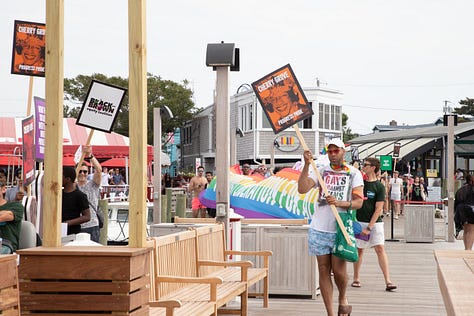
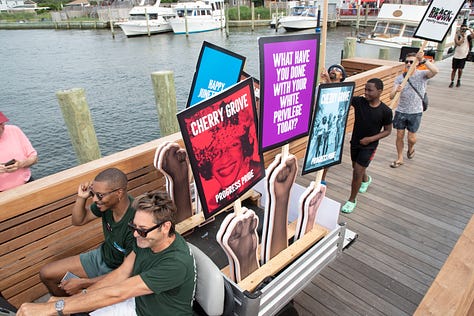

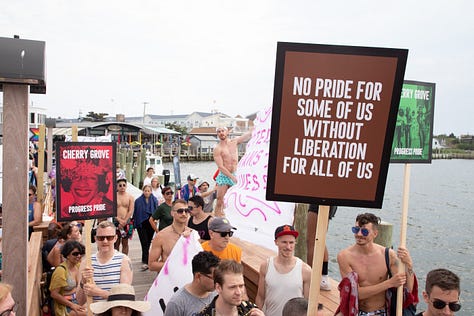
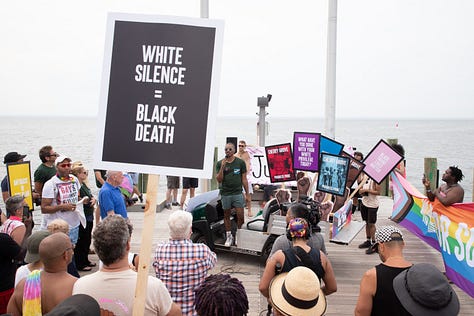

BaBEC's inaugural Juneteenth weekend marked a watershed moment. I'd never witnessed such racial diversity in my seven years of Fire Island visits. It may sound trivial, but that weekend was the first time I heard hip-hop music at the Tea dances three days in a row. That’s a big deal! Our programming for the weekend wasn’t happenstance. Much of it was a deliberate counterpoint to the island’s oversights or missed opportunities. Take, for instance, the Miss Fire Island Pageant, which, in its five-decade history, had only crowned four Black winners. In response, we staged an all-Black drag pageant, pledging to crown a Black drag artist every year henceforth. But perhaps the most poignant moment came when we hoisted a new Progress Pride flag (see slide 6) over Cherry Grove's dock, a beaming symbol of inclusivity and welcoming for the community.



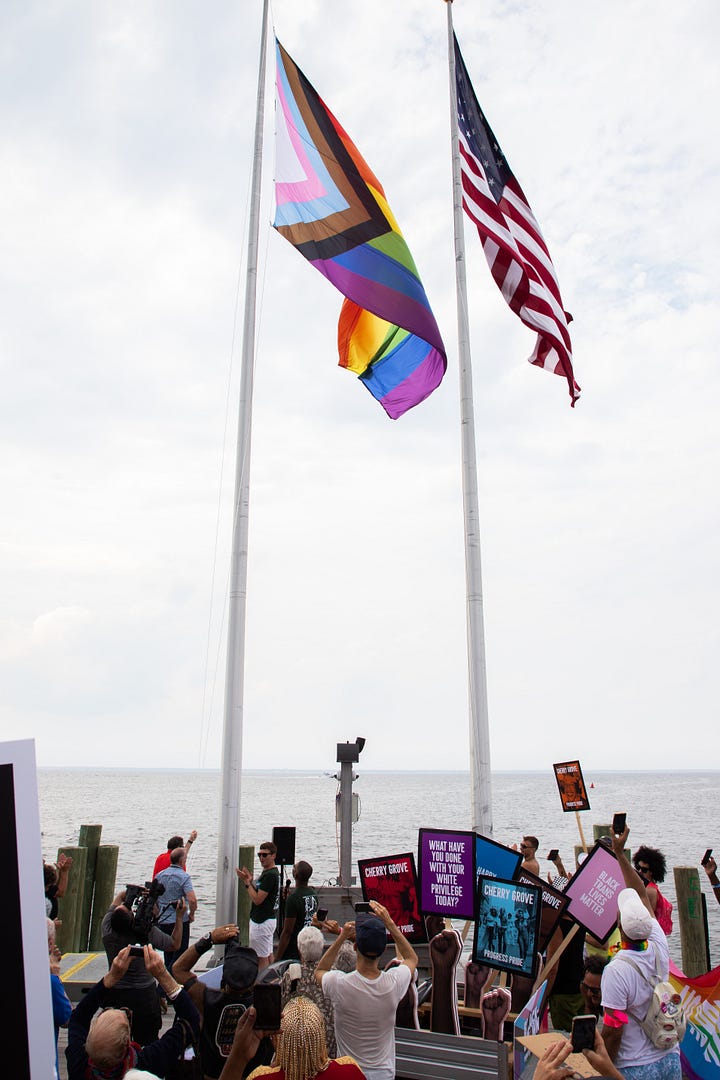
The Huffington Post asked me to write an article about the weekend experience, as they had already sent their photographer to document it. In the article, I talked about the beauty of the weekend and the adversity.
“We had hoped [APCG and CGCAI] would rescind their invitation to the Suffolk County Police Department, and their decision not to is a prime example of building something without the most marginalized members of the community in mind. Their decision was racist and transphobic because it put the value of one figurative blue shirt over the lives of hundreds of Black, brown and transgender people.”
That article threw a bomb into the community. A moderator of the Facebook group “Cherry Grove Untucked” quickly removed the post I made for the article and told me that if I had instead named their actions “not antiracist or trans-inclusive,” it could’ve stayed up. So now, not only was I the bad guy for telling them about the police in real life, but I was also being tone-policed online.
On June 28, 2021, one week after Juneteenth Fire Island – two days after the Huffington Post article, APCG terminated our fiscal sponsorship, which was fine. We didn’t want a percentage of the money we were raising going to an organization that had revealed itself not to be value-aligned. We had $12,000 left over after Juneteenth that we wanted to use to continue to grow our organization. We also had sixty days to find a new fiscal sponsor in our contract. We explored several organizations, but none could complete the process in that time frame. So after the sixty days, instead of holding the money for us, APCG donated $4,000 each to Gays Against Guns (GAG), Northstar Fund, and Black Trans Femmes In The Arts – three organizations that BaBEC had nominated as donor recipients of our Community Redistribution Initiative. With that initiative, we donated a portion of money from Juneteenth fundraising back to the BIPOC-led nonprofits. $1,000 each is what we agreed upon. With all of our money gone, they effectively cut off our organization at the knees. This would work out in APCG’s favor as they would soon announce their own version of BaBEC, the “Diversity, Equity, and Inclusion Committee,” or, as I’ve heard it called, the “Division, Ego, and Ignorance Committee.”
The week after Juneteenth 2021, the Cherry Grove Pride Parade came around, and guess what was missing from the harbor—the Progress Pride Flag. The week after that was the Drag Invasion of the Pines. Guess what was missing from the harbor—the Progress Pride Flag. BaBEC had no communication around why it was down or when it would fly again, but of course, it came back down to Diane Romano and Thom Hansen. In the Facebook group “Cherry Grove Uncensored Part Deux,” someone made a post about the flag, and Diane commented that at a CGCAI meeting, it was discussed how there were now three Pride flags that would be rotated every two weeks; the six stripe Gilbert Baker flag, the eight stripe Gilbert Baker flag, and the Progress Pride Flag. I asked why BaBEC wasn’t invited and informed that this would be on the agenda, considering that we purchased the Progress Pride flag and had an entire ceremony for it. No answer. BaBEC decided then that this initiative to fly the flag was incomplete until we got it to fly permanently on the dock and figure out a way to honor Gilbert and his legacy simultaneously.
In the middle of the season, BaBEC began working on plans to bring unconscious bias training to Cherry Grove, hoping it could happen before the Summer ended. On July 23, 2021, I contacted Thom to see if BaBEC could use the Community House for one day in August or September to host the same unconscious bias training we organized in Fire Island Pines. Thom replied that the theater would be available if we turned over all of our contacts for the initiative and let it be organized and promoted as an APCG initiative. This is when I realized that the “Community House” should just be called the “APCG House” because the ways in which they gatekeep it do not rise to the full definition of the word community. They had already expressed that the training was too long, if not wholly unnecessary because some board members do this at their jobs.
Why would I turn over an initiative that Victor and I worked so hard to bring to this community only to let it get stripped to its bare bones? Why would I let these people take the credit for the hard work that we put into this? I replied to Thom and let him know that we had put a lot of time and energy into planning this and didn’t see the merit in just passing it off. I also said that if APCG really sees the value of this and wants to work in coalition by providing the space, we would love to continue planning this initiative for the greater good of the Cherry Grove community. I got no response.
It was then that I began to hear rumblings of the newly minted Diversity, Equity, and Inclusion Committee forming within APCG. Interestingly, they scheduled a DEI speaker on the same day BaBEC had requested the Community House for unconscious bias training. Their approach differed markedly from ours: they invited someone to talk to them, while we planned to engage with trainers in a dialogue. My immediate question was about the committee's membership. Unsurprisingly, Thom and Diane were on the roster, the same folks who controversially invited police to march in the Grove Pride Parade during Juneteenth Fire Island weekend. Two former BaBEC members were also involved— longtime Black homeowners who both resigned from our organization after stating that they didn't experience racism on the island in the way that we characterized it and painted us as trying to run a smear campaign against Cherry Grove. The committee also included seven other community members. This committee wasn't established out of an authentic desire for change. It was a reactive move, sparked only after BaBEC came into existence. APCG had been around for seventy-three years and didn’t feel it was essential to have this committee until BaBEC showed up and called them out for their stance on the police. Their committee has only served to advocate in ways that prioritize white comfort. Admittedly their programming has made an improvement this year, but they still largely implement initiatives that make white people feel better about themselves.
Until the Summer of 2020, when I launched BaBEC, I would take my last ferry ride off the island at the end of each summer and be so sad about the season being over, already counting the months until I could return. The island was a magical place for me. But at the end of Summer 2021, I left the island for the second year in a row, feeling an enormous sense of relief. I actually couldn’t wait to get out of there. The adversity that BaBEC had experienced was wearing on me. Before I had a voice, I had only ever experienced microaggressions on the island. But almost as soon as I picked up the microphone and started speaking authentically, speaking about what I envisioned for the future of Fire Island, was when overt racism began being uncovered. I don’t know what I expected. Never in the history of the United States have Black people come into a predominantly white neighborhood asking for equity and been met with smiles and open arms. Experiencing it was more than I bargained for, though.
The icy looks from people in the Grove hurled my way when I got on the ferry, walked down the boardwalks, and attended community meetings were hard to deal with. But I knew that it was all by design. In their “welcoming” community, these people wanted me to feel unwelcome. They wanted me to burn out and leave. But I’m an Aries–a fire sign. Despite realizing that I needed to figure out how to move forward and prioritize my peace, I was still going to continue moving forward. In my heart, I knew I was doing the right thing with this work. People would tell me that they believed in me and that I should keep fighting the good fight, but they would say it in whispers out of fear that the community might turn against them if they were public advocates of BaBEC and myself. History has proven that no progress is made without disruption, and there I was, the disruptive thinker. But at what cost?
I needed to make more space in my life for peace, and the prospect of another winter in NYC after a tense summer in Fire Island felt depressing. I decided to move somewhere cheap, hot, and gay. So, in August 2021, I moved to Puerto Vallarta. Getting wholly out of NYC for ten months was good for me, and it allowed me to think about the big picture of what I wanted for BaBEC. I didn’t want to have another summer where I spent all of my energy focusing on putting out little fires. I didn’t even want to focus on being the best entity advocating for a more inclusive Fire Island. I only wanted to focus on being the best BaBEC, period. So around Spring 2022, when BaBEC began planning our second Juneteenth Fire Island weekend, I contacted all of our coalition partners who had worked with us the previous year to implement programming. One by one, they all told me that Diane Romano had already contacted them and asked them to work with the DEI Committee for the Juneteenth weekend they were planning independently of our organization.
Summer had not even arrived, and here they go again, scheming and plotting to make us a nonentity in the community. Some of our coalition partners chose to work with the DEI Committee exclusively because it gave them access to the Community House, a power that APCG continuously flexes over Cherry Grove. The property system in the United States has a history of being a mechanism for perpetuating exclusion, and this was a prime example of that. One of our former coalition partners even said to me, “They have the Community House, and I think eventually you’re going to get tired of running your head into a brick wall.” I found that interesting, considering that our entire gay liberation movement was started mainly with–a brick.
So, at this point, the DEI committee was two for two when it came to copying things that BaBEC has done – an unconscious bias talk and a Juneteenth weekend celebration. I was waiting for them to do something original. Eventually, I got a text message from their committee chair informing me of their plans. They wanted to plan the calendar so it didn’t overlap with ours. This felt disingenuous after knowing how Diane was going behind our backs and trying to make our coalition partners sever ties with us.
As another Juneteenth weekend rolled around, the air was again thick with BIPOC jubilee. In the lead-up, BaBEC circulated a survey asking the community's sentiment on making the Progress Pride Flag a permanent fixture on Cherry Grove's dock. We also invited ideas for paying homage to Gilbert Baker and the original pride flag. The question on the survey was, "Do you think the Progress Pride Flag should fly permanently on the Cherry Grove dock?" Respondents got to select "Yes,” “No,” or “Don't Care." We got 66 Yes's, 19 No's, and 0 Don’t Care’s. Of course, there was pushback that said our survey was not representative of Cherry Grove. The outsider's narrative was being used again. Standing on the dock, I shared the inspired suggestions of how to honor Gilbert Baker in a speech, underlining why keeping the Progress Pride flag aloft throughout the summer is vital for the ongoing narrative of inclusivity.
Overall, we had a good Summer until the end of the season when I got word from a Cherry Grove homeowner with close ties to APCG & DEI that Diane Romano had planned a dinner, where she invited members of the Committee on Black Equality (CoBE), a committee of primarily Black homeowners within FIPPOA, to come and listen to why each member of the DEI committee does not like me, Victor, and BaBEC. What a way to break bread! Again, I reminded myself not to focus on the little fires and to move forward with what I had planned for the growth of my organization. It was hard, though. Imagine someone hosting a dinner to explain to people why they don’t like you.
Fast forward to March 2023, I was invited by a lovely woman named Jess Rothschild to participate in her upcoming podcast series, Finding Fire Island. Jess wanted to discuss my experience on the island and the work that I have done with BaBEC. I hesitated to participate because Cherry Grove has closed ranks around me whenever I’ve opened my mouth. But I did the podcast anyway and eagerly awaited its debut in July. When it finally premiered, I was impressed by how incredibly well-done it was. Each episode took a deep dive into a specific aspect of the island's history and culture. The fifth episode was dedicated entirely to The Invasion and featured none other than Thom Hansen and Diane Romano.
Victor, who was also featured on the podcast, told me about the episode first. He said that if I hadn’t listened to it yet, I should because it’s excellent. He also mentioned how interesting it was to find parallels in our stories, and he was right. Like many people who frequent the island, I knew the Invasion's larger story. A drag queen goes to The Blue Whale in the Pines, is denied service for being in drag, returns to the Grove, and tells his buddies who return to the Pines the following week, all in drag. Or was it the next year? I knew the gist of the story, but the granular details were beautifully revealed in this podcast. One thing that I found interesting was how Thom mentioned that original invaders were viewed as outsiders. They were disruptors of what John Whyte, the owner of much of the Pines commercial district at the time, wanted to be known as a family neighborhood. Thom and his friends were fueled by adversity to John Whyte and FIPPOA.
It all sounded so familiar as, in contrast, BaBEC has been characterized as outsiders and disruptors. We have largely been fueled by adversity to APCG and CGCAI. Cherry Grove views us as outsiders coming in with egregious demands like we’re the Galactic Empire in Star Wars. In the podcast, Diane says, “How can they hate us? They don’t even know us.” As soon as she said this, I screamed, “Seriously?!!” It’s the same thing that I’ve been wondering for three years! They have been arbiters of the same exclusionary tactics that were perpetuated onto them almost fifty years ago, and I wonder if they even realize it.
When I first listened to the podcast episode featuring Thom and Diane, I had already been invited by the American LGBTQ+ Museum to moderate a discussion with them. The episode resonated so profoundly that it felt like a cosmic nod affirming that I should accept the role—which I did. Naturally, given the fraught history with APCG, I braced for pushback. However, I never anticipated they would take the nuclear option and cancel the entire event.
This leaves us at a standstill. It's crucial to clarify that my tireless advocacy for these communities that I deeply care for has always been a labor of love—uncompensated and voluntary. Not to undercut anyone's involvement in other Fire Island committees, but spearheading efforts for Black and transgender equity on Fire Island presents unique challenges. Despite the island's affluence, BaBEC operates on a shoestring budget, barely able to fund our Juneteenth activities, let alone employ a staff. I invest not just my time but emotional labor into BaBEC, treating it as a full-time job on a volunteer basis. When other nonprofit leaders hear the scope of my efforts, they're often astounded at the lukewarm community support we've garnered and that my commitment remains unpaid. It's also disheartening to see larger organizations with multi-million-dollar budgets host a single pool party and immediately attract a deluge of financial support, only for them to leave and never be heard of again for an entire year. Our fundraising efforts, by comparison, feel like an uphill battle, which is frustrating because our work is specifically for the benefit of the Pines and Cherry Grove all summer long.
So when an opportunity like the one from the American LGBTQ+ Museum comes up—where I was set to receive $1,000—it stings to see that opportunity vanish. I reside in a tiny 200-square-foot Brooklyn studio. I can’t easily afford overnight stays on the island or buy into a shared housing arrangement. That money holds significant value for me. I've been reserved about openly discussing APCG’s past missteps, but this financial meddling is the tipping point. We have a serious issue that has pushed me to be more vocal.
A question that I often get from people is, “How can we get you all to work together?” BaBEC’s mission statement explicitly says that we will work with “value-aligned people, businesses, and organizations on and off-island.” APCG has repeatedly shown itself not to be value-aligned. And how many times can we get slapped and then asked to turn the other cheek? When does the accountability shift? Why aren’t people asking the aggressors to stop slapping us? When do the aggressors halt their offensive? Asking the victim to compromise continuously isn't just unfair; it’s insulting. I grew up in the South, and I think I prefer how Southern whites are open about their intolerance. At least you know what you’re getting. When you get to bigger cities, white people will offer you a helping hand as long as you are careful to agree with them but slap you down once you start acting like you don't know your place. I often hear people’s perception of Cherry Grove is that it is the more welcoming and diverse of the two communities. On the surface, it is. If you take nothing else from this article, take this: the problems in Cherry Grove are systemic and institutional. They require significantly more community involvement to be improved.
How To Move Forward
The discord splintering our community arises from a fundamental disconnect: different generations, distinct racial backgrounds, and contrasting priorities and worldviews. To truly mend these rifts, we need more than good intentions. We need professional intervention. That's why I proposed Beyond Diversity 101, the intensive two-day training led by experts in unconscious bias. This isn't about ticking a box; it's a commitment to wrestle genuinely with our preconceptions. On the first day, people naturally arrive with their guards up. The second day of training allows participants a night to digest, regroup, and return more open to genuine empathy and compassion. Ideally, a commitment to this annual training—shared among BaBEC, APCG, and CGCAI—is essential to our community's future. And yes, at $6,000, not including accommodations for trainers, it's an investment. But can we afford not to make it? I'm still hopeful that, given all that has unfolded, there will be an appetite for this level of engagement. So, if you're part of the Cherry Grove community—or even if you're not but care about it—I challenge you: Be part of the solution. Advocate for the training; make your voice heard. And stay tuned; next week, I'll navigate the tricky terrain of allyship on Fire Island, exploring what true partnership looks like when stakes are high and comfort zones are breached.
Index
APCG - The Arts Project of Cherry Grove
BaBEC - The Black and Brown Equity Coalition
BD101 - Beyond Diversity 101
CGCAI - The Cherry Grove Community Association, Inc.
CoBE - Committee on Black Equality
FIPPOA - Fire Island Pines Property Owners Association
If this essay has resonated with you, I invite you to take action:
- Subscribe to my Substack; I only need four founding subscribers to recover from the lost panel moderation opportunity.
I’ll see you with a new article here next week.











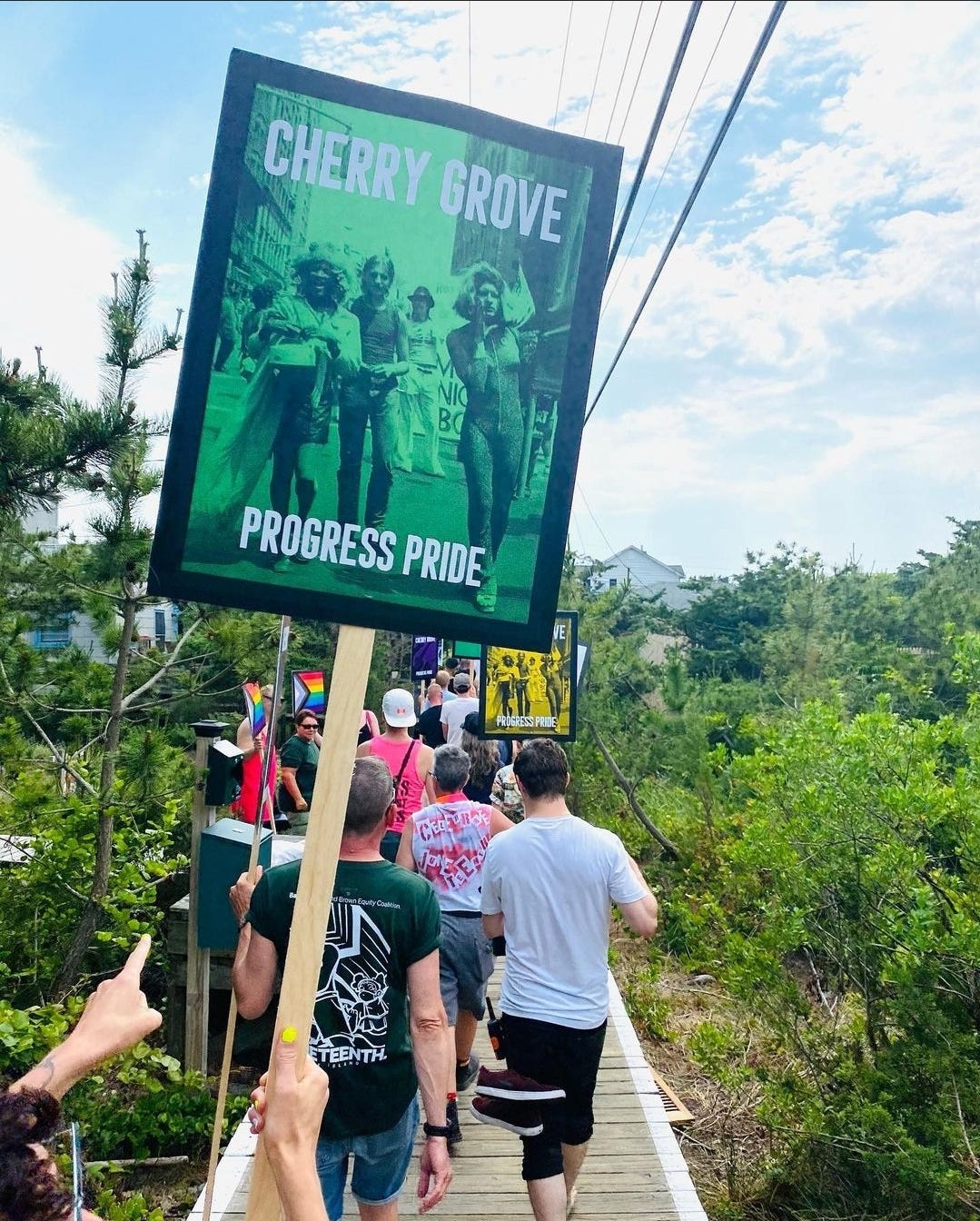

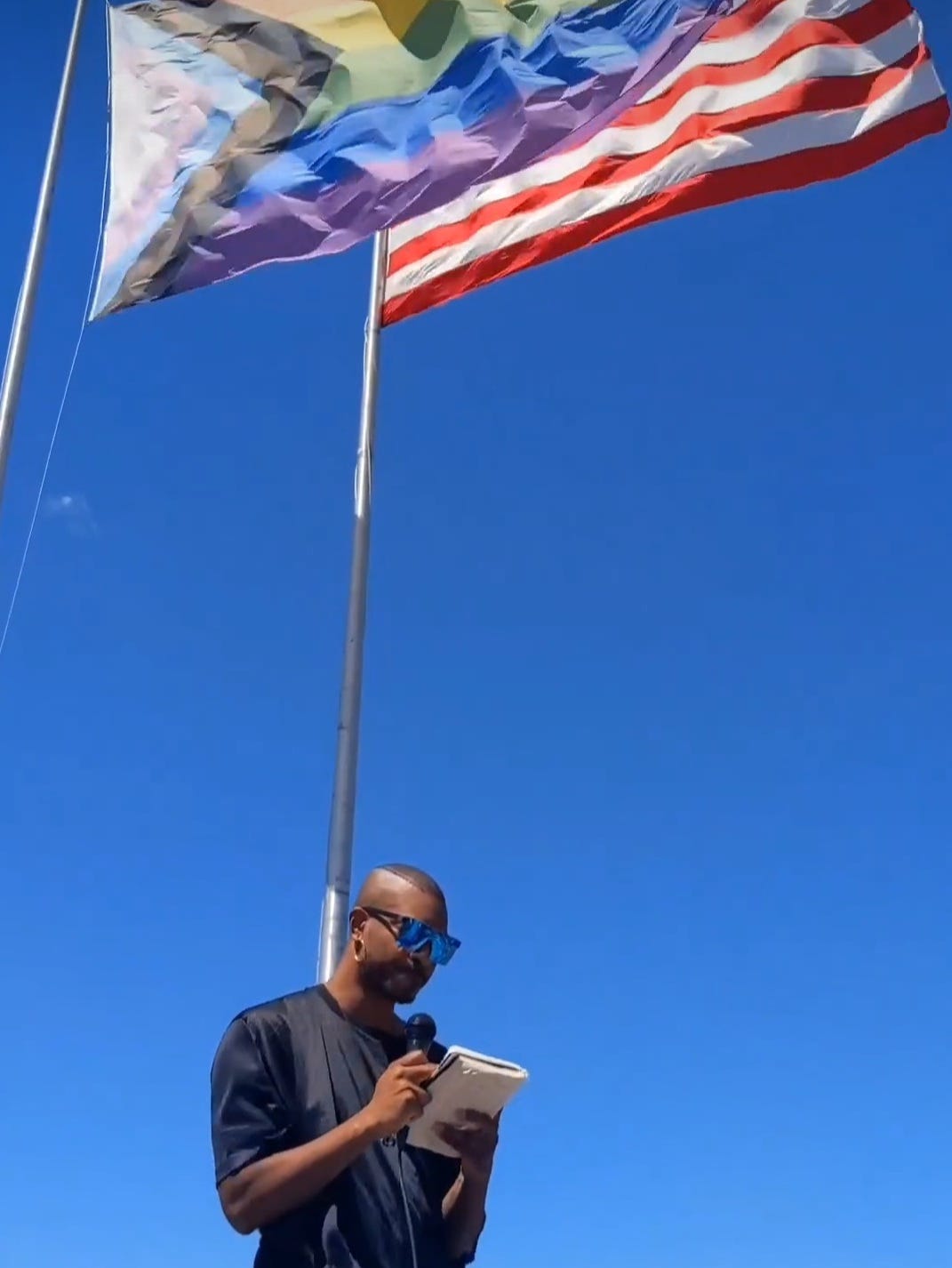

Thank you so much for taking the time to write this. I was tangentially aware of bits and pieces of it, but I had no idea of the full extent.
I am very committed to DEI in all areas of my life and, in particular, to the goals and ambitions of well intentioned advocates and neighbors here in Cherry Grove. I and others have supported financially and in many other ways the goals you espouse...and not as “Johnny Come Lately’s”, but for decades.
Sadly, your post is full of personal invective. It comes across as frustrated and angry. Rather than entertain what are clearly your personal “beefs “with particular persons, I’d like to hear about your views concerning the impact of the efforts undertaken to date to accomplish our shared vision. Many of us in the Grove and Pines have enthusiastically joined in the effort to move the needle in addressing real and perceived inequities. With respect, BaBEC is not the one and only way to go.